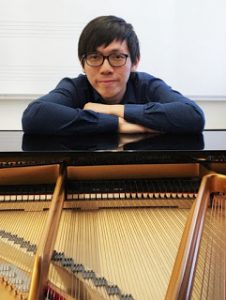
What is improvisation?
The first encounter with improvisation started when I was 16 years old. Back then, I was required to improvise on the piano with lead sheets and thus began my personal discovery of making music with improvisation. Later on, after many years of improvising in this single area that I realize that improvisation is far broader and applicable than just on the piano.
From my honest opinion, I think that improvisation is being who we are as human beings. In fact, we have been improvising from the day we were born. The very existence of communication, and the execution of it through conversation is an act of improvisation. For instance, when we talk to our friend or someone we do not know, it is only possible for us to summarize the point of each sentence before we ‘improvise’ the rest of the sentence. So the question remains now is: If improvising is a part of human nature, why do we have such enormous difficulty translating this ‘skill’ to our instrument? Perhaps, many of us allocate improvisation to having a special skill or belonging to an elite group of individuals.
I used to think that improvising requires special training or talent but I realize that improvisation is NOT a special skill. It was this misconception of improvisation in many people (myself included) that led me to think that we need to find pedagogue materials or develop improvisatory methodologies, etc. Surely, these are indeed excellent and valuable materials for people who would want to start improvising regardless of their starting experience. However, the understanding of the purpose of the material in the process of an improvisatory attempt affects entirely the concept of improvisation itself.
My role in improvisation:
Another common misconception of improvising is how one is expected do everything all at once by oneself at the moment, in perfection. However, the truth is far from this. There are many roles during an improvisation act. In the workshop, we will encounter a few of these; supportive roles in terms of harmony or rhythm; and solo roles. I always consider my role when I’m improvising as part of an entity in absorbing and transferring the energy.
I’m afraid of improvisation!
This is perhaps the second most common reason or excuse people do not improvise. (The first being improvisation is a skill for a specialized and elite group) It is human that we feel fear in doing things we are not familiar with. This fear is necessary in helping us know our body language, the readiness of our mind in a situation.
How then does fear play a role in improvisation?
I prefer to regard the fear as a by product of letting ourselves be involved in something of the unknown – that is in simpler words, taking risks. Thus, the understanding of fear and the extend in which we take risk is a process that we can use to know the stress limits and mechanisms that is at work in our body while we react with fear during improvisation. In my opinion, fear exists as positive and negative energy. It is thus part of my goal in improvisation that we are able to transform negative energy to positive ones before and during the act of improvising.
How do I start to improvise?
- Understand that improvisation starts before you touch your instrument
- Recognizing the ‘now moment’ in any situation in life, with and without instrument
- Doing things in a different way, even on the smallest scale is also improvising.
- Being conscious of the tensions in our body parts during our daily ‘improvisation experiments’, and proceeding to relax those areas as we repeat the activities.
All the above are not restrained by the instrument, but they are applicable to improvising on the instrument during improvisatory activities.
My approach to improvising on the piano:
There are two approaches in which I try to use when facilitating an improvising activity. The first is based on applying fundamentals of western music theory into practical improvisatory activities/ exercises – systematic applied improvisation. The second is the use of expressive gestures in free improvisation. I’ll introduce various activities that can encourage one to improvise during the workshop.
